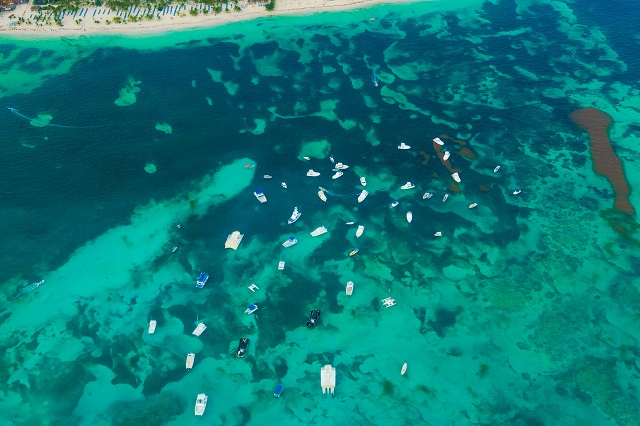I stared, with fascination darting around the edges of my grief, at the plastic litter strewn over miles of Hawaii’s coastline.
We were hiking toward the Big Island’s green sand beach.
On the main road, a group of locals ran a renegade (illegal) shuttle service, charging $10 to skip the hike, and ride instead in the back of a lifted truck or SUV.
Our hiking mate’s friendly question if they’d accept $15 for the three of us had been met with a Mafioso-style suggestion that he go jump off the sea cliff instead.
The tourists who were undeterred by the nature of the enterprise (or less fond of hiking) bumped past—blurs of worried expressions and bright Hawaiian shirts.
We had chosen to escape such distractions and instead follow a meandering road along the coastline, expecting pristine views of the sea crashing into new volcanic land.
My first sight of the debris was an unexpected shock of inorganic color, as if someone had poured all the leftover paint from their basement onto the beach. The longer I looked, the more the aberrant blobs of color emerged into focus:
A shipping crate from Japan, mounds of fishing net and thick rope, a pink shower caddy festooned with hearts, a placard from a Russian chemical company (if it’s in the ocean, I’m suspicious of where the chemical it designated ended up), toothbrushes, and bottles of every sort, from bleach containers to household spray bottles.
A large black barrel lay forlorn on its side near the surf, occasionally catching a wave and bobbing out into sea, only to return with the next large wave.
Dotted across the black and white sand were worn pebbles of fluorescent plastic. Some approached the size of my fist, others were barely larger than the sand particles that surround it. (I had read about microplastics such as these, that become deadly contributions to the diets of marine life.)
Although I have made many efforts to avoid typical American consumption patterns, buying my clothes exclusively at thrift stores and owning minimal possessions, I realized—staring at the refuse the world had forgotten it threw away—that I still wasn’t getting it.
There is no away that we throw things to, no guiltless void connected to our trash receptacle—whisking away single-use plastic and chemical spray bottles to their magical inanimate afterlife.
On the contrary, what we throw away remains here, with us. It is forming islands in the Pacific, belching methane, contaminating waterways, and asserting humans as the uncontested winners of any “rudest house guest” awards planet Earth may be giving out.
I think of the words of Charles Eisenstein—who never fails to lovingly but firmly rattle my paradigms and inspire me into loving action—about how small shifts in our everyday habits are insufficient to halt the momentum of humankind’s environment degradation.
Instead of “8 Ways to Make your Office Greener,” we need to radically restructure the ways of thinking that allow us to treat the planet with such callousness.
My call to action is not to use less plastic, to recycle more, or use mason jars for this, that, and everything (though feel free to do all of those things). Clever and eco-friendly life hacks rely entirely on human initiative and self-control, and those are flimsy and variable barriers to place between the planet and our immense ability to destroy.
My call to action, instead, is to go outside of your home or office, drive out of your city if need be, and establish a relationship with the natural world.
It is okay if it’s a tentative handshake at first. It is okay if it is more like a tearful reunion with a lost love. We must start where we are if we are to venture any further.
Once acquainted, I hope that you will begin to feel appreciation. After all, there is much to appreciate. Nature provides the bounty for the ingredients of our favorite snacks, and the best color palettes. It is nature that dreamt up the flecks of colors in our loved ones’ eyes.
From that place of love and appreciation, no one will have to tell us to do what we can to respect the myriad of life forms we share the planet with. We will do what needs to be done out of a love similar to that which we feel for our human families.
Perhaps you will be inspired to engineer solutions for the looming issues you see needing to be addressed, utilizing your unique combination of ingenuity, interests, and skills.
As for me, I loaded all the debris I could fit into a huge discarded fishing net, fashioned it into a backback, and trudged—lop-sided and rope-burned—back along the beach in the fading evening light.
With every step, I sensed a fire growing larger inside of me, too large to ignore. The fire told me one thing, clearly:
I would return.
~
Author: Maggie Jo Parsons
Image: Konstantin Kopachinsky/ Unsplash
Editor: Khara-Jade Warren








Read 1 comment and reply